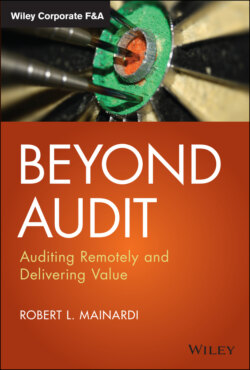Читать книгу Beyond Audit - Robert L. Mainardi - Страница 21
AUDIT FIELDWORK
ОглавлениеAfter the planning phase comes the audit fieldwork. During this phase, the auditors must continue to work the audit and business partner relationship each time client documentation or data is requested, clarification of a business process step is required, or validation of a potential deviation from the business processing standard is noted. In each one of the previously listed incidences, the auditor is going to be required to communicate directly with the client to obtain the information or gain an explanation of an unknown. This creates the perfect opportunity for the auditor to build additional rapport with the business partner in an effort to gain trust to strengthen the bond between the two. Think about not only how critical these interactions are with the client but also how difficult these can be to execute when it is being done remotely. Being in audit over 30 years, I can attest to how challenging the fieldwork phase is, especially when additional information, data, or detailed explanations are needed to complete a test. Now complicate that need with the facts of the client not being readily accessible or the questions requiring answers are difficult. That is what remote auditors are facing on a daily basis. During these remote audits, auditors may not know if a client is available for questions or willing to answer the phone when it rings. And if the client does answer, will the client have the time to discuss and explain the challenges the auditor is facing, or will a new meeting have to be scheduled to address the issues? Everyone in business knows how difficult it is to schedule business meetings with representatives from multiple units. While this type of situation will not stop the audit from progressing, it will impact the timing of the audit testing and will result in the auditors having to reacquaint themselves with the test requirements. All of these situations affect the timing of the targeted audit completion.
Also, remember to prepare for this impromptu follow-up meeting with the client, as the auditors must be ready with the exact topics, questions, and data which are to be discussed in this call. If the auditor is not adequately prepared for this call, I can guarantee you three things:
1 The call will not sound professional.
2 The audit client will not be happy with the interruption and lack of respect regarding effective use of their time.
3 The auditor will not receive all of the information required to complete the testing and possibly forget an item, which will require another call.
All three of these outcomes damage the audit and business partner relationship, and in established relationships create unnecessary erosion. It may not seem like a significant issue at the time, but the repeated calls or interruptions due to a lack of preparation on the auditor's part will create stress on the relationship, which impacts the audit team's ability to access critical information to complete the audit in a timely manner (close to the allotted budget) and establish a productive communication channel to facilitate issue validation, root cause, recommendations, and action plan discussion needed to deliver a value in the final audit report.
